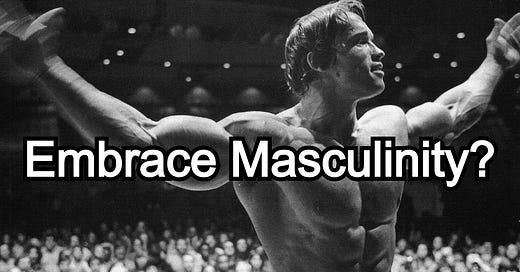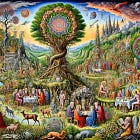MetaMasculine - Intro and Suggested Reading Order
At the intersection of masculinity, psychological development, and personal myth
In today’s hyper-polarized world at war we are forced into an endless battle, where any attempt to play devil’s advocate brands you as the devil himself. Friendly debates for discovering truth have been replaced by a radical moral imperative to violently choose a side.
To be completely honest with you…I’m exhausted by it. I’m exhausted by the constant reactive fighting that takes us nowhere other than further and further apart.
If you prefer youtube or spotify you can click those links.
So with all of that being said then, my substack is partly about finding a way through the muck of woke vs. anti-woke, and instead moving into something beyond either. Obviously my channel is called MetaMasculine, and so the primary audience I’m speaking to largely consists of men. I think one of the reasons for this polarization is precisely that the traditional roles for men have been absolutely gutted.
I’ll be uploading an essay soon that defines what exactly I mean by “MetaMasculine,” but I think there are positive and negatives to this development. I think our traditional roles needed to be updated, but too often this has led to people pathologizing masculinity itself. Too many think there is something wrong with men and with being masculine. We’ve been cast as the villain without any real positive vision for what masculinity could become.
I wouldn’t dream of pretending like I have all the answers to this problem. Instead, I hope to ask interesting questions and start defining what might be some interesting provisional answers to them. For the rest of this essay then, I want to give you a sample of some of the questions I’ll be addressing on this substack.
1. The first is, obviously, what does it mean to be masculine? What might a positive vision of masculinity actually look like and why do we even need one?
2. Secondly, what kind of psychology or way of feeling, thinking, and acting can find its way through the muck of polarization and toward that positive vision of masculinity?
3. Thirdly, how can we integrate evolutionary psychology’s definition of masculinity with the feminist and postmodern critiques of masculinity? I think this question right here perfectly exemplifies the polarization I’m talking about. These seem like diametrically opposing worldviews, and yet it’s not that one is wrong and the other is right. That is polarization. Personally, I think there are important truths in either that help balance the other out, and we need to figure out what that actually means.
4. The fourth question may seem a little out of left field, but I actually think the three first questions lead us to ask, what does it mean to be an individual? Regardless of what exactly masculinity is or should be, whether that’s defined by evolutionary psychology or by feminism or postmodernism, what exactly does it mean to be an individual? Who exactly are YOU, personally, beyond what all of these academic theories try to tell you?
5. And number five, once we’ve created and discovered our individuality, how can we protect ourselves against radical ideologies that seek to hijack us for their own purposes? We often call the hyper-polarized “NPCs” because it almost seems like they’re an empty vessel who can only spout their cult’s accepted viewpoints.
6. This leads us then to the sixth question, what are the positive psychological and social functions of spirituality and religion? Personally I am an atheist and so I am well-aware of the relation between religion and radical ideologies that hijack our individuality. However, I also think that the latest cognitive science of spirituality and religion have demonstrated that there is a very precious baby in all of that very grimy bathwater.
7. And so finally, what kind of psychology will be able to handle biological immorality. Okay, I know this one seems radically unrelated to everything I’ve been saying so far, but I actually think it connects everything I’ve said so far.
One of the best arguments against humans becoming immortal is that our culture will ossify. There will be no change or improvement because everyone will just stay the same. The physicist Max Planck1 is well-known for saying, essentially, that “science progresses one funeral at a time.” This captures the idea that people aren’t often convinced to change their minds about things. We like to think of scientists as a sort of paragon of change, always being open to update, always being open to new evidence, but that often just isn’t the case in practice. Personally, I think this tendency to become close-minded in the very people who should be the most open-minded also means that culture progresses one funeral at a time.
Without funerals, you can see very clearly how much of a problem this can become. However, I hope you can see very clearly how this relates to everything I’ve discussed so far. Polarization into radical ideologies, redefining and updating masculinity, and developing the psychology to move beyond polarization to become your own individual. These are all very much aligned with becoming the kind of person who doesn’t ossify, who doesn’t become rigid in their belief systems.
The topic of biological immorality is one that I find intrinsically fascinating, especially coming from my own psychological perspective. I won’t be spending much time addressing it directly, although I will, but the reason I am mentioning it now is because I think it really does serve as a really powerful way to understand how the different questions I’ve mentioned are connected.
So, with all of that being said, these are just some of the topics I’ll be addressing on this substack. I already have a few essays up so definitely check those out. The first defines what the Authentic Self is, which is obviously important for understanding how to define who you are as an individual. The second gives a definition of conformity, or the herd mentality that stops us from living our Authentic Self. The third goes into the evolutionary necessity of mythology, especially in today’s increasingly secular, atheistic culture. You won’t regret going to read them right now and joining the conversation in the comment section.
Thank you so much for your time and attention. I wish you all the best on whatever journey you find yourself on.
Recommended Reading Order:
Psychology of the Chained Vortex - Your Society Is Sick
Psychology of the Kathekon - Your Masculinity’s Prison Warden
Psychology of Akedia - What Slaughtered Masculinity?
Psychology of Epithymia - The Brainrotting Succubus of Nihilistic Hedonism
References:
1 - https://en.wikipedia.org/wiki/Planck%27s_principle













Do you know what the prefix meta implies? It is a fascinating Greek word.
I also have a tripartite definition ;)